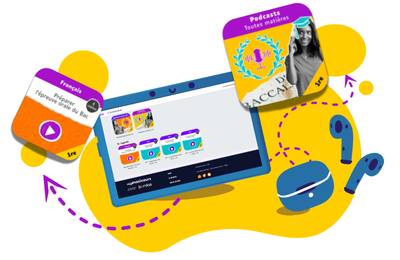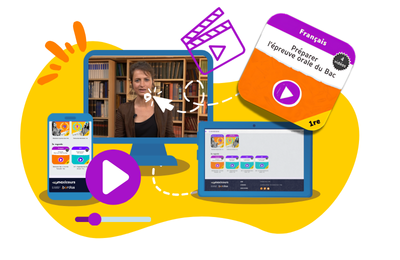The USA and the Space Race
- Fiche de cours
- Quiz et exercices
- Vidéos et podcasts
- Découvrir un aspect de la notion d'étude innovations scientifiques et responsabilité
- Approfondir ses connaissances sur la Conquête de l'Espace et la Guerre Froide
- L'un des domaines dans lesquels s'opposèrent les États-Unis à la Russie lors du conflit de la Guerre Froide fut la conquête spatiale.
- Des années 1950 à 1975, ils n'eurent de cesse de vouloir prouver la supériorité de leurs avancées technologiques en envoyant dans l'espace des satellites, des fusées, des hommes.
- Derrière cette course folle, il s'agissait de montrer la primauté de son système politique.
- Le symbole de cette période reste le premier pas de l'Homme sur la lune le 20 juillet 1969.
A few years after World War II had ended a new conflict began between two great powers, the United States and the Soviet Union. Known as the Cold War, this battle rested on the conquest of space and each side wanted to prove that its technology was by far superior to its opponent’s. But it was also the opportunity for each country to claim that its political system was better. So, in the eyes of the world, it was very important for each competitor to win the space race.
The Cold War started in the mid-1950s between the USA and the Soviet Union and each country tried to get as many arms or nuclear weapons as possible so as to be able to defend themselves in case of an attack. Spies were everywhere because the USA and the Soviet Union were afraid of each other and wanted to know what the other was preparing. Some events like the construction of the Berlin Wall and missile crisis in Cuba exacerbated the tensions too. The space race started then.
The first to enter the competition were
the Russians who placed an artificial
satellite (Sputnik) into the Earth’s
orbit on October 4, 1957. It was vital
for the Americans, who had now good reasons to
fear their opponents’ nuclear power, to
reply. Moreover, as great explorers they were angry and
upset to acknowledge that the Russians had started to
explore a new territory before them. They had crossed a
border that no one had crossed before!
In 1958 the USA launched Explorer I and
President Dwight D. Eisenhower created
the NASA, well-determined to explore space,
whatever the costs.
One year later the Russians launched Luna 2
and in April 1961 Yuri Gagarin
became the first person to travel in outer
space. One month later, after testing
chimpanzees, Alan Shepard was the first American
to be sent into space.
A few weeks later,
President John F. Kennedy announced that
an American would land on the moon in the years to
come. And he was right because
on July 16, 1969 Neil Armstrong,
Buzz Aldrin and Michael Collins embarked on
Apollo 11 and on July 20, Armstrong
became the first man to walk on the moon, declaring
Consequently, after such a brilliant feat, the world could declare the Americans winners of the Space Race after 12 years of attempts and failures on both sides. It was a fantastic adventure for the rest of the world who could follow the exploits of the astronauts on a new medium, the television, and the latter were of course considered as the new heroes of the world. The Russians were the great losers of the race, unable to prove the world the power of the communist system in spite of all their efforts.
The Cold War ended in 1975 when a Russian-American spacecraft was launched, symbolizing a considerable warming in the relations between the two powers.
After World War II where they had proved how important and essential their involvement in the conflict had been, the Americans wanted to continue their efforts in the eyes of the world and win another battle, not on Earth this time but in space. They did it and new heroes won broad acclaim when the final stage of the race saw Neil Armstrong plant the national flag on the moon. A new era had just started.
— October 4, 1957: The Russians place an artificial satellite (Sputnik) into the Earth's orbit
— 1958: The USA launch Explorer I and create the NASA
— April 1961: Yuri Gagarin becomes the first person to travel in outer space
— July 20, 1969: Armstrong becomes the first man to walk on the moon
— 1975: End of the Cold War

Des quiz et exercices pour mieux assimiler sa leçon
La plateforme de soutien scolaire en ligne myMaxicours propose des quiz et exercices en accompagnement de chaque fiche de cours. Les exercices permettent de vérifier si la leçon est bien comprise ou s’il reste encore des notions à revoir.

Des exercices variés pour ne pas s’ennuyer
Les exercices se déclinent sous toutes leurs formes sur myMaxicours ! Selon la matière et la classe étudiées, retrouvez des dictées, des mots à relier ou encore des phrases à compléter, mais aussi des textes à trous et bien d’autres formats !
Dans les classes de primaire, l’accent est mis sur des exercices illustrés très ludiques pour motiver les plus jeunes.

Des quiz pour une évaluation en direct
Les quiz et exercices permettent d’avoir un retour immédiat sur la bonne compréhension du cours. Une fois toutes les réponses communiquées, le résultat s’affiche à l’écran et permet à l’élève de se situer immédiatement.
myMaxicours offre des solutions efficaces de révision grâce aux fiches de cours et aux exercices associés. L’élève se rassure pour le prochain examen en testant ses connaissances au préalable.

Des vidéos et des podcasts pour apprendre différemment
Certains élèves ont une mémoire visuelle quand d’autres ont plutôt une mémoire auditive. myMaxicours s’adapte à tous les enfants et adolescents pour leur proposer un apprentissage serein et efficace.
Découvrez de nombreuses vidéos et podcasts en complément des fiches de cours et des exercices pour une année scolaire au top !

Des podcasts pour les révisions
La plateforme de soutien scolaire en ligne myMaxicours propose des podcasts de révision pour toutes les classes à examen : troisième, première et terminale.
Les ados peuvent écouter les différents cours afin de mieux les mémoriser en préparation de leurs examens. Des fiches de cours de différentes matières sont disponibles en podcasts ainsi qu’une préparation au grand oral avec de nombreux conseils pratiques.

Des vidéos de cours pour comprendre en image
Des vidéos de cours illustrent les notions principales à retenir et complètent les fiches de cours. De quoi réviser sa prochaine évaluation ou son prochain examen en toute confiance !









